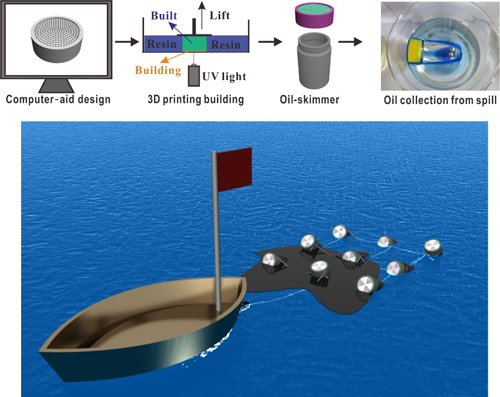
Schematic illustration of practical oil collection from spill with the 3D printed oil-skimmers. (Image by ZHOU Feng et al.)
Frequent oil spill accidents on seas and discharge of industrial oil-containing waste water have posed a great challenge to environment. Consequently, oil removal and collection has become an urgent task and various techniques have been developed to address the issue. However, the current techniques all have certain shortcomings, such as high cost, low oil absorption capacity, and weak oil keeping stability.
The research group headed by Professor ZHOU Feng at the Lanzhou Institute of Chemical Physics (LICP) of the Chinese Academy of Sciences (CAS) has developed a 3D printed oil-skimmer for oil collection from spills with outstanding oil collection capacity and collected oil keeping stability.
The oil-skimmer contains two main parts, namely the top 3D printed mesh treated with low surface energy materials and the bottom container. The good water repellency of the 3D printed mesh realizes high efficient floating oil removal by filtration, while the bottom container achieves the oil collection by storing the oil directly.
Importantly, the collected oil does not escape from the vessel under ambitious stirring or reversion, indicating that the skimmer’s great potential for application under the sea waves or even storm conditions. Moreover, taking the advantage of 3D printing in computer-aid design and freeform fabrication, the oil-skimmer including not only the top mesh but also the bottom container can be designed and fabricated in field, which makes the 3D printing oil-skimmer highly promising for the practical oil collection from oil spill in ocean.
The work has received financial support from the National Natural Science Foundation of China, Key Research Program of the CAS, and West Light Program of the CAS.
The findings have been published in Adv. Mater. Interfaces(Adv. Mater. Interfaces2016, DOI: 10.1002/admi.201600015).
Contact:
ZHOU Feng
State Key Laboratory of Solid Lubrciation, Lanzhou Institute of Chemical Physics, Chinese Academy of Sciences, Lanzhou 730000, China
E-mail: zhouf@licp.cas.cn

